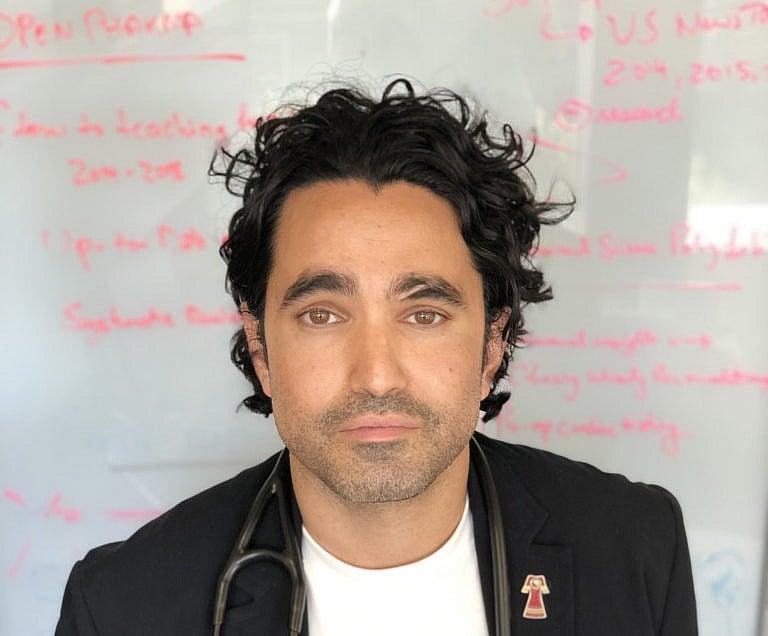The idea: FoodRX, the prescribed food delivery program
“Food insecurity can affect everything from cognitive development to anxiety to diabetes,” says UHN’s Dr. Andrew Boozary, on the correlation between access to food and your health.

Dr. Boozary leads the Gattuso Centre for Social Medicine Innovation at the University Health Network in Toronto (Photo courtesy UHN)
Share
Not being able to purchase nutritious food is just one more way being squeezed financially impacts your health. About one in 10 Canadians had difficulty buying food regularly during the second wave of the pandemic, according to Statistics Canada data, while a study from Food Banks Canada showed food bank visits were up 20 per cent when comparing data from 2021 and 2019. And the cost of food is forecasted to keep rising—a report from Dalhousie University estimates Canadians will see prices go up by five to seven per cent this year.
There likely are, and will be, unfortunate spillover effects of this—how well you eat impacts how well you feel. “Food insecurity can affect everything from cognitive development to anxiety to diabetes, throughout all age categories,” says Dr. Andrew Boozary, who leads the Gattuso Centre for Social Medicine Innovation at the University Health Network (UHN) in Toronto. The UHN has created a pilot project to help get food boxes to those who need them most, but Dr. Boozary is clear on what the actual problem is: “People do not have the income to be able to afford nutritious food.”
The Idea: Making nutritious food available for those who have the most difficulty accessing it by providing them with a “prescription” for healthy food delivery.
How it works: Food Rx is a partnership between UHN and FoodShare to deliver a box of fresh fruits and vegetables every two weeks. What’s in the box varies by week and season (one box in June, for instance, contains bananas, peaches, kale, grape tomatoes, and a rutabaga).
Since launching in 2021, the pilot program has reached 206 participants, which include those who live in government-assisted housing, receive social assistance, face financial barriers to accessing good food, and have been impacted by COVID-19. Participants are surveyed regularly, and preliminary results showed that, three months into the program, there was an increased sense of connection and a higher level of quality of life reported, while self-reported levels of physical and mental well-being also improved.
“We’ve heard from communities again and again that access to nutritious food matters,” says Dr. Boozary. Programs like these directly address what people want and need, he adds, creating a shift from asking patients, what’s the matter with you? to asking what matters to you?
“The argument is actually that we have to deliver health care fundamentally differently,” says Dr. Boozary. “ We need different partnerships in delivering healthcare to be able to integrate social factors that we know have such a massive impact on people’s health outcomes.”
The big picture: Dr. Boozary says while of course nutritious food improves health outcomes, this program isn’t a silver bullet—it’s an emergency response to failing social systems.
“We want to do everything we can to address things that we know are driving people into emergency departments and the acute care sector,” he says, adding that he’s mindful of working with partners who know their communities best to avoid hospital overreach.
But he’s clear that a food delivery program can’t simply be scaled up to solve a much more complex problem: “This is not a sustainable response, and it’s not one that I think we can see as a replacement for the real work that needs to be done.”
Part of what needs to be done is approaching these issues differently in the healthcare sector. He uses the example of someone making the decision between paying for food or paying for medication—when the prescription isn’t renewed because the patient had to choose a basic need, they are labelled non-compliant by their doctor or nurse. “Let’s push back on the way that we try to silo our approaches to thinking about that person’s health,” Boozary says. “It’s not about that person being non-compliant—we have systems that are failing that patient.”
What is ultimately needed, he argues, is an “upstream” policy response addressing issues like minimum wage, raising levels of social assistance, providing pharmacare, and other supports, given the reality of the affordability crisis Canadians are facing across the country. “Both in the health and social sectors, we’re staring right at a massive wave of suffering that is completely human-designed by us failing to act on the policies that we’ve long-known we’ve needed.”
This story is part of a series on food insecurity in Canada funded by the Maple Leaf Centre for Food Security, in partnership with Community Food Centres Canada.